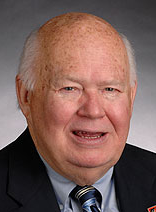 From President to Dean – Reflections on a Unique Registry Assignment
From President to Dean – Reflections on a Unique Registry Assignment
Dr. Charles “Chuck” Ruch
Member
The Registry
“We Shall not cease from exploration | And in the end of all our exploring |
Will be to arrive where we started | And know the place for the first time.” – T.S. Eliot
A few year ago, I completed my second Registry placement as an interim Dean of a College of Education. As I think back, these were two of the most interesting, rewarding, and personally challenging of my career. By way of reference spent the first half of my professional life in Colleges of Education. I had the good fortune to serve in faculty, chair, Associate Dean and Dean positions. Then, a quarter of a century in central administration, Provost and President (twice). Make no mistake, I truly enjoyed my time in the byzantine world of teacher preparation and school reform—the work of Colleges of Education. Yet my life in senior University leadership was truly challenging, rewarding, and more than a bit narcotic. Consequently, the Registry assignments to return to ‘leadership from the middle’ were not without personal and professional concerns. Could I successfully return to my professional roots and a role I left many years prior? Here’s a few of the things I experienced.
Moving into a new professional role requires a skill set one develops over the years. I found the move from president to dean quite different in two regards. First, presidential experience gives one a way of ‘viewing’ and ‘operating’ in an organization. Applying these learnings to a deanship—middle management—presents a mixed set of challenges. Your reputation and experience give you an unusual status as a dean. Your ability to diagnosis institutional processes, articulate strategies, and, ideally, move the unit forward at an accelerated rate does not go unnoticed. You quickly enjoy a different relationship with other deans and offices across campus. However, at the same time there is a ‘downside,’ These same experiences, skills and strategies permit you to identify problems that are now beyond you span of responsibility and authority to resolve. For me, this was so unlike my presidential life. I found some days having to quietly shake my head in amazement, withhold commenting, or remind myself that this one is ‘not my problem.’
Clearly, the presidential focus is on the institution; the Dean on the academic disciplines or professional concerns. In this kind of interim assignment, you not only have to learn your new institution, but concurrently reconnect with your profession. In my case I had been away from teacher education for well over two decades. During that period, I had little to do with teacher education issues or the profession itself (that is what I had a Dean of Education for). During the first few months of each assignment I felt like Rip van Winkle. Some of the issues I confronted sounded like I had never left, other were very new. The learning curve was both steep and, given the interim nature of the assignment, accelerated. In retrospect this became one of the truly ‘value added’ dimensions of this kind of interim assignment.
During these two assignments, I came to recognize the similarity of skills requisite for success in both the president and dean’s office. This is especially true for Colleges of Education. Both require leadership of complex organizations. Like the host institution, Colleges of Education deliver several programs in multiple settings, must develop collaborative strategies to accomplish goals, respond to a large, diverse group stakeholder, comply with an ever-increasing number of demands for accountability and transparency, and conduct an entrepreneurial approach to resource acquisition. I found many of the needed skills in one role, nicely transferred to the other.
A final observation about this kind of interim assignment. I found the collegial relationships among the ‘permanent’ and this ‘interim’ most rewarding. It provided opportunities to be a resident ‘consultant/mentor’ to fellow deans in ways the Provost or other senior administrators were unable. I was struck with the needs of deans for continual professional development—upon reflection, something I too often forget while in my presidential role. To even, for a short period, partly respond to this need, was a personal ‘plus.’
So, there you have it, one can return to one’s academic roots, and ‘know the place for the first time.’
HIRE AN INTERIM
Searching for an Interim?
Please contact us for more information.

